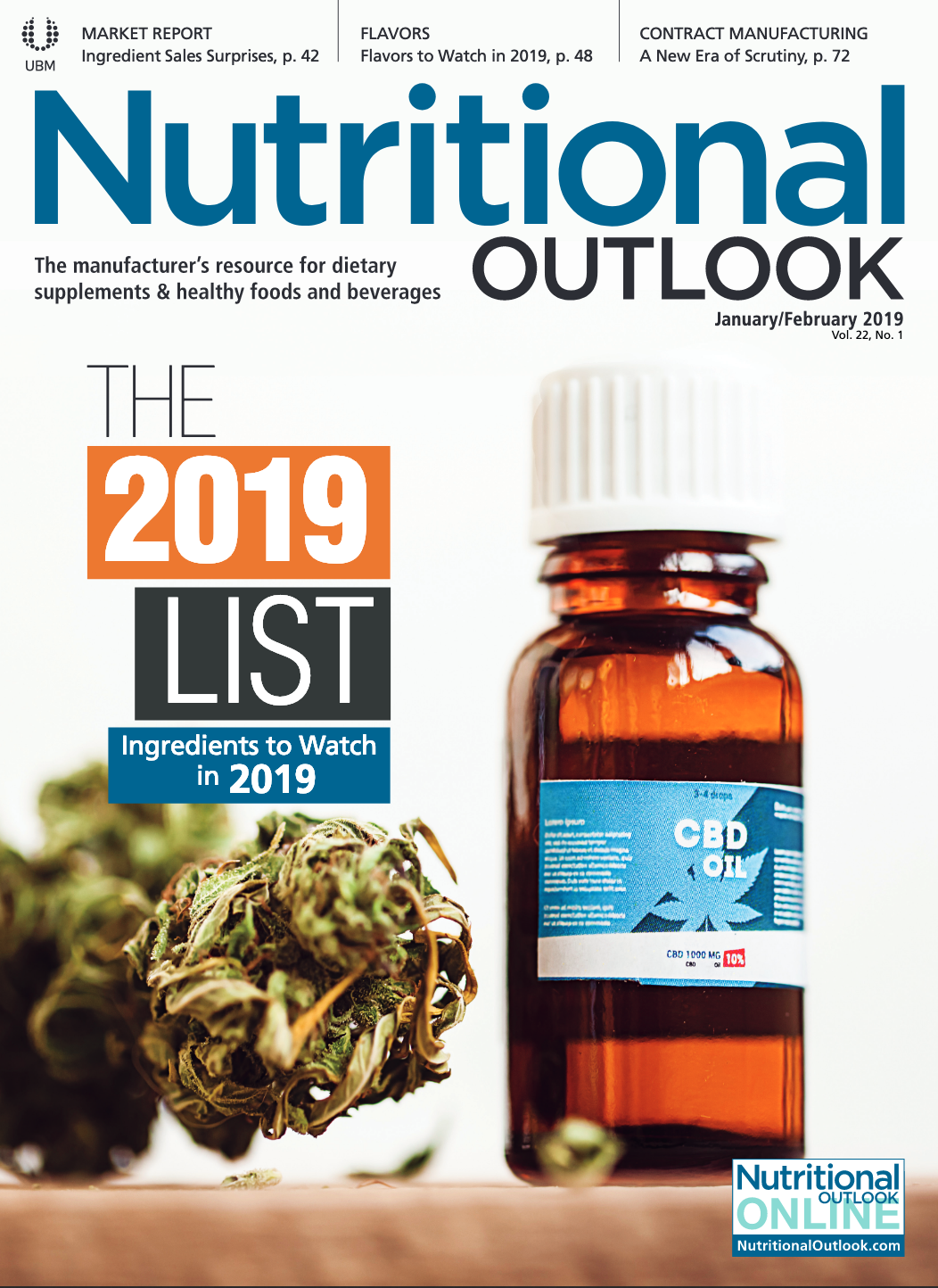2019 Ingredient trends to watch for food, drinks, and dietary supplements: Lutein
Messaging about the importance of lutein-and about eye health supplementation overall-is taking effect mainstream.
Photo © Shutterstock.com/WIRACHAIPHOTO

Consumers are gleaning what the lutein industry has known for decades: that lutein is an essential nutrient for healthy vision and that lutein supplementation is important at every age. According to SPINS tracking, sales growth for lutein ingredients in the eye-health category (U.S. conventional multioutlet channel) outperformed growth of any other eye-health ingredients in that channel in the 52 weeks ending November 4, 2018, increasing 38.8% to more than $52 million in sales compared to $38 million a year ago. That growth is impressive, and it means that messaging about the importance of lutein-and about eye health supplementation overall-is taking effect mainstream. The overall eye-health supplement category-vitamins, supplements, herbs, and homeopathics-itself grew during that time frame (in the U.S. conventional multioutlet channel), increasing nearly 6% to $347 million.
Part of the messaging taking hold of consumers is that lutein can help protect the eye against blue-light damage-short-wavelength, high-frequency light emitted by, among other things, electronic screens-that leads to degenerative conditions such as age-related macular degeneration (AMD). The National Eye Institute at the U.S. National Institutes of Health projects that by 2050, the number of people in the U.S. with AMD will more than double from 2 million to 5.4 million. As phones, tablets, and monitors continue to command our daily attention, these estimates will likely bode true.
Clearly, consumers are looking for eye health and blue-light protection, evidenced by the number of blue-light eye-health supplements (all featuring lutein) now on the market. From Twinlab’s Ocuguard Blutein line and Bausch and Lomb’s Ocuvite Blue Light supplement to Puritan’s Pride’s Lutein Blue Light Vision Guard, Quantum Health’s Digital Blue supplement, and Nature’s Bounty’s Lutein Blue supplement, companies see the opportunities here.
“Interest in blue-light–blocking products is not slowing down,” says Ceci Snyder, MS, RD, global vision product manager for Kemin Human Nutrition & Health (Des Moines, IA), a supplier of ingredients including its flagship FloraGLO Lutein. Snyder notes that “Kemin is the author of a patent on how lutein blocks blue light, which our customers continue to find worthwhile,” and says that consumers connect with messages addressing symptoms they experience every day: digital eye strain and fatigue. “Concise messages work best to educate consumers quickly on labels or in social media,” she adds. “The eye health and lutein [categories] will continue to grow because of increasing awareness of blue light from digital devices and sunlight.”
Brian Appell, marketing manager for OmniActive Health Technologies (Morristown, NJ), says, “Consumers are making the connection between blue light and eye health.” He notes: “What’s interesting is that we’re seeing this interest across different demographics and lifestyles.” (Some of the blue-light supplements mentioned above, including Puritan’s Pride Lutein Vision Guard, Twinlab’s Blutein, and Nature’s Bounty’s Lutein Blue supplements, feature OmniActive’s Lutemax 2020 ingredient containing lutein, zeaxanthin, and meso-zeaxanthin.)
The consumer audience for lutein and blue-light supplements is expanding. Appell explains: “The lutein market was built primarily on a prevention model of supplementation that has catered to the 50+ age group. That demographic will continue to sustain lutein growth as the population ages; however, there’s a much broader consumer base that could accelerate growth.” Although most demand is still coming from the healthy-aging sector concerned about AMD, glaucoma, and cataracts, younger consumers are an untapped market, and products to this subset can be marketed differently.
“Younger generations are more interested in the immediate relief of eye issues related to digital device use, as well as optimizing their visual performance,” says Appell. Twinlab’s Ocuguard Blutein line includes a chewable supplement for, the product label says, “digital eye health for younger eyes.”
Snyder says: “Senior adults are more likely to receive eye doctor direction for an AREDS supplement.” (AREDS is the National Institutes of Health landmark Age-Related Eye Disease Study on AMD and supplementation. Kemin’s FloraGLO lutein was used in the study.) “Younger consumers, especially those who embrace a healthy lifestyle as a way of life, are eager to enhance their eye health. We know most consumers have no intention of giving up their phones, tablets, or computers, so the reasonable and easy option is to take lutein supplements for blue-light protection.”
“Marketers are taking note” of lutein, OmniActive’s Appell says, “and we are committed to continuing to raise awareness, now with an added emphasis on the ‘essentiality of lutein,’ which will likely figure more prominently in products for infants to seniors and everyone in between.”
Eye health isn’t all that’s driving interest in lutein. There is also early interest in other lutein health benefits, including brain and skin health.
“Cognitive health is an exciting area of new research with FloraGLO Lutein,” Snyder says. She notes that the ingredient has been studied in four randomized, double-blind, placebo-controlled trials linking the ingredient to benefits such as improved visual memory, complex attention, and reasoning ability. In one such study1, she adds, “The fact that improved cognitive function was observed in healthy, well-nourished young adults was noteworthy.”
OmniActive, meanwhile, has published studies showing that Lutemax 2020 supplementation resulted in higher levels of brain-derived neurotrophic factor (BDNF), a protein implicated in neuroplasticity and learning, memory, and cognition, and has also studied its effects on lowering stress-related cortisol levels.2 “We’re excited by the results of the research showing benefits associated with cognition, stress management, and even sleep, to name a few,” Appell says. “That research is making its way into consumer formulas,” he adds, predicting that “you’ll soon see more product launches that diverge from lutein’s traditional use as an eye supplement.”
Skin health is also an emerging lutein interest area. Both Kemin and OmniActive have studied their ingredients for this indication.3,4 Already, Nature’s Bounty offers its SkinElasticity nutricosmetic featuring FloraGLO lutein and vitamin A.
Lutein suppliers say 2018 was a good sales year for them, and they expect no different in 2019. Market researcher Euromonitor International forecasts global volume consumption of lutein ingredients to grow nearly 32% by 2022 (increasing from 1,195 tons in 2017 to 1,575 tons in 2022).
2019 Ingredient Trends to Watch for Food, Drinks, and Dietary Supplements:
- Lutein
References:
- Renz-Hammond et al. “Effects of a lutein and zeaxanthin intervention on cognitive function: a randomized, double-masked, placebo-controlled trial of younger healthy adults.” Nutrients. Published online November 14, 2017.
- Stringham NT et al. “Supplementation with macular carotenoids reduces psychological stress, serum cortisol, and sub-optimal symptoms of physical and emotional health in young adults.” Nutritional Neuroscience. Published online February 15, 2017.
- Palombo P et al. “Beneficial long-term effects of combined oral/topical antioxidant treatment with the carotenoids lutein and zeaxanthin on human skin: a double-blind, placebo-controlled study.” Skin Pharmacology and Physiology, vol. 20, no. 4 (2007): 199-210
- Juturu V et al. “Overall skin tone and skin-lightening-improving effects with oral supplementation of lutein and zeaxanthin isomers: a double-blind, placebo-controlled clinical trial.” Clinical, Cosmetic and Investigational Dermatology. Published online October 7, 2016.

HHS announces restructuring plans to consolidate divisions and downsize workforce
Published: March 27th 2025 | Updated: March 27th 2025According to the announcement, the restructuring will save taxpayers $1.8 billion per year by reducing the workforce by 10,000 full-time employees and consolidating the department’s 28 divisions into 15 new divisions.

























